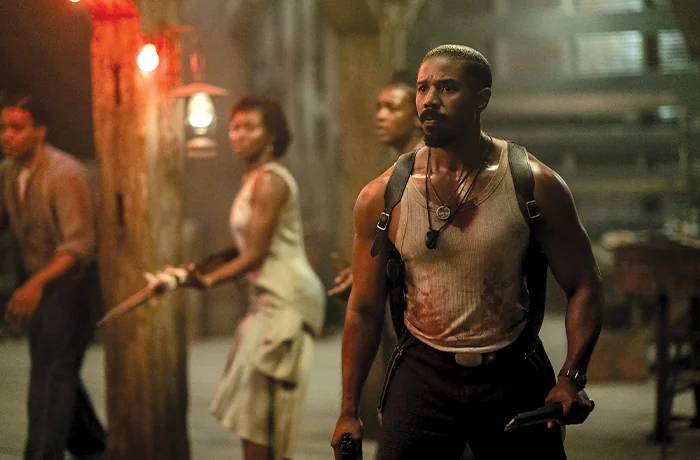Ryan Coogler was born to be interesting, but fate has instead consigned him to importance.
After erupting onto the scene in 2013 with Fruitvale Station, Coogler was parachuted into the Rocky franchise to direct Creed, saving the franchise and Sylvester Stallone from self-parody. However, achieving such excellence so soon was the worst possible development of his career. Marvel Studios picked up Coogler’s heat register like the Predator alien and, in keeping with its general policy for promising young talent, bought him out before he could become competition. Coogler’s talent burnished the Marvel brand and inextricably tied the march of social progress to cape-slop for an embarrassing couple of years. Artistically, the casualty lay in shifting Coogler’s focus from the singular black American experience to the macro. In other words, from people to a People.
Sinners is Coogler’s first original film since his debut, and while there is true joy in seeing him stretch himself after so many years cooped up in the Marvel mines, the joints still ache. The film follows identical twins Smoke and Stack Moore, both played by Michael B. Jordan via Parent Trap wizardry. They are fitted in red and blue hats, which is helpful for those of us who see neither race nor the color green. The twins are reversing the Great Migration. They return from Chicago, where they made their fortune as enforcers for Al Capone, back to the Mississippi Delta with plans to open a juke joint. They have the venue, the catfish, and a whole tenement of dark Irish beer. In their defense, prohibition in an already dry county essentially cancels the other out.

Their real ringer is their little cousin Sammie “Preacher Boy” Moore (Miles Caton), who plays the blues so damn good it borders on supernatural. This proves more true than they would like, as Preacher Boy’s voice reaches out into the void and calls forth not just the ancestors, but more nefarious beings who also happen to be eavesdropping. The first half of the film follows the formation and fermentation of the juke joint, a section which, at its best, is some of the most alive filmmaking you’ll see this young year. It’s no contradiction to say it also too often reminded me of the parody biopic Walk Hard: The Dewey Cox Story, in which the black club owner demands Dewey play so his customers can “dance erotically.”
Here, the film shifts into genre, no spoiler to mention as the trailers and billboard will tell you as much. The vampire Remmick (Jack O’Connell), an Irish one at that, is also drawn to the music. He, too, wants an invitation to the cookout, though he has a different soul food in mind. An innocent night of erotic dance suddenly devolves into a siege, with only the bloodsuckers’ traditional courtesy of waiting for an invitation keeping them at the threshold.
A lazier filmmaker would have kept this a simple metaphor for appropriation and assimilation. However, in an interview on the Filmmaker Toolkit podcast, Coogler stressed his own affection for Irish music and acknowledged the Irish as victims, though not on the same scale. The vampires are as much a temptation as a threat, a third way of solidarity against the powers that be. Remmick may want to kill everyone, but seems offended at the suggestion that it’s racially motivated. His pitch is that the Klan already wants them dead. At least when he’s through with them, they’ll be immortal. As victims reanimate outside the juke joint door, black and white alike join in a communal jig, baptized anew in the riverdance.
For a film called Sinners, religion plays a key but pointedly lesser role than most vampire flicks. Preacher Boy is not merely a clever name, with his pastor father disapproving of his musical ambitions. The battle for his soul is also for the soul of the movie. Yet prayer has no effect here, and in any case, this is the Delta and not the Bayou: Catholics and their vampiric solutions are at least a bus ride away. The way of God and the way of the devil is the usual dichotomy in the genre, but it’s not a zero-sum game here. If each is merely its own form of subjugation, Coogler asks, what choice do you have but to force your own?
Sinners is full of such interesting questions, to which it regrettably has answers. The film rarely takes the risk of being inexplicable, either to us or itself. Themes are raised, and characters invariably represent a concept and not themselves. Even the vampires are played a bit too straight, not straying too far from the usual suspects of garlic and stakes. The aforementioned jig is the most haunting part of the movie precisely because it’s so inexplicable, something we understand more than we comprehend.
Yet for all this griping, I had a marvelous time at the movies watching Sinners. Why? Because for all its heady notions, this is the first time in nearly a damn decade that I’ve found Coogler interesting.
Joe Joyce is a writer. Follow him on X at @bf_crane.























